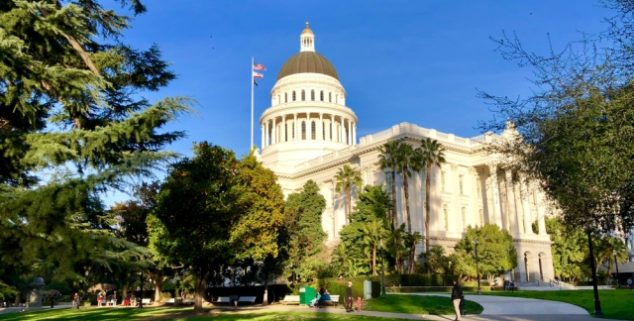News
Enter the programmer: Lobbying, money and data
 California's state Capitol in Sacramento, home of the goverrnor's office and Legislature (Photo: Shutterstock)
California's state Capitol in Sacramento, home of the goverrnor's office and Legislature (Photo: Shutterstock)When it comes to political money, much of the public’s attention is riveted on campaign donations to candidates, parties, ballot propositions and independent committees.
That’s not surprising: More than $1 billion was spent during this election cycle on campaigns through Nov. 5, with more than a third of that, $370 million, going to fights over ballot propositions, according to the Target Book’s most recent estimate.
But a huge piece of political spending involves the payments by well-heeled interest groups to lobbyists – there are about 1,800 lobbyists registered in California — who represent their clients before the Legislature and state government. In 2017, these groups spent about $339 million.
And that brings us to Dave Middleton, a local programmer and former political operative who recently created what he says will be a useful tool for both journalists and researchers — California State Lobbying Search, an open-source public records tool designed to help find the connections between specific bills and lobbying efforts.
Middleton spent about 200 hours researching, planning and coding to create a data pool that includes information from the Secretary of State’s website, open-source resources like the California Civic Data Coalition and political search tools like Cal-Access.
“This allows users to rapidly search lobby filings by bill name, keyword, or company, like ‘all 2018 lobbying involving bills about nutrition,'” Middleton says.
There are a number of tools for researchers and journalists to nail down political cash.
Politico Pro, for example, which is based in Brussels, Belgium, offers an artificial intelligence tool that analyzes and tracks legislative policies to assist researchers and reporters. In 2017, Digiday reported Politico Pro had 20,000 subscribers, many of whom are institutional memberships at $8,700 per year, although the price tag can be far higher.
“Let our advanced AI tool do the research, so you can focus on the strategy,” the Politico Pro website reads.
AI is another example of the mix of data, politics and journalism, Middleton notes.
“Politics is way more data-centric than it used to be,” said Middleton, 40. “I feel like there is a place for tools like California State Lobbying Search. If it does solve a problem, I just want feedback,” Middleton added.
But there’s a portion of Middleton’s life that isn’t as easily solvable.
Middleton grew up in the Boston area and was heavily involved in the music community. He toured nationally with his band before moving to California in his early 20s.
“But one day I woke up and went to practice (my guitar) — which is how I started my day– and my left forearm hurt. I stopped playing, hoping it would go away,” Middleton said.
“This pain has stayed with me ever since, slowly expanding to other areas,” he added. After years of doctor visits and tests, the only answer he has, is this: “I have undiagnosed chronic pain.”
Middleton decided to teach himself how to be a programmer, something he envisioned would be easier on his body that he could accomplish at a comfortable pace. “The internet is made for coding resources, most of it is just accepting that it’s really hard to start. It’s so foreign at first.”
He paraphrases a coding book he read a while ago: “You have to first accept that nothing less than perfection will do,” he said. “But that’s not how things like people work, relationships don’t work that way or art doesn’t work that way. If there is a comma missing in your code, everything dies.”
Middleton networked his way through Sacramento and assisted with the launch of CALmatters, the Sacramento-based nonprofit journalism venture geared to informing readers of California policies and why they matter.
Later, he met political consultant Mike Phillips at a wedding in Sacramento, and Middleton landed a job at the start-up Vigilant in 2015. What began as a three-man team eventually headed into opposition research for Hillary Clinton’s presidential campaign and they also took on financial and journalistic clients.
But he said 16-hour work days eventually took a toll on his body, so he stepped aside in 2017. But he still assists with projects when he can.
As for the future of California State Lobbying Search, Middleton said, “That’s up to journalists.”
“The way programming works, you can build something in a month and then you can get feedback and you can change it. But government websites can take years to rebuild and improve,” Middleton said.
For journalists, coding could be the future. “If you have good research tools, it can allow you to ask broader questions and it can allow you to ask new questions. It can give you new leads,” he added.
“Whatever is wrong with me, it is the hardest problem to solve, in my life. Every coding challenge is a microcosmic version of that. Every time that I solve a challenge it keeps giving me faith that I will have answers,” Middleton said.
“I just have to keep going long enough, and it’ll work.”
Want to see more stories like this? Sign up for The Roundup, the free daily newsletter about California politics from the editors of Capitol Weekly. Stay up to date on the news you need to know.
Sign up below, then look for a confirmation email in your inbox.

Leave a Reply